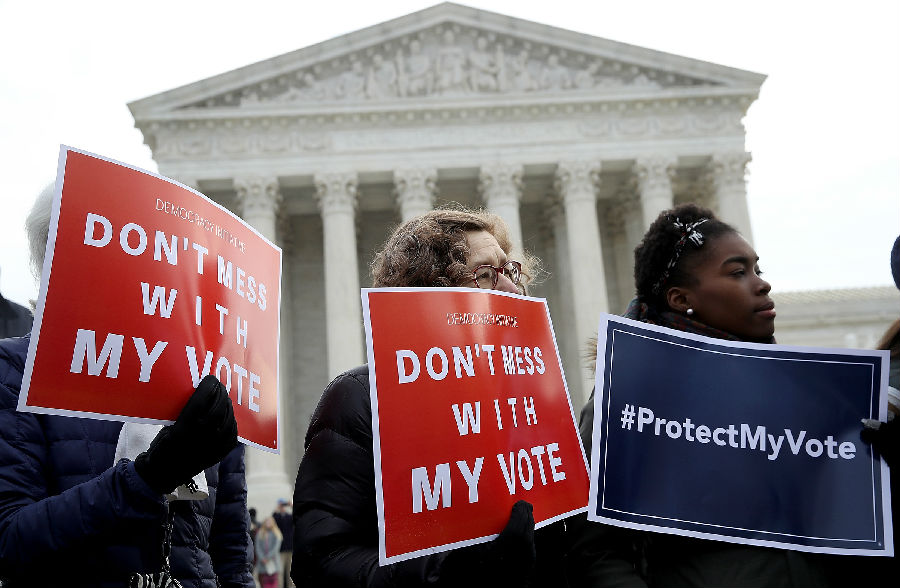What does the Supreme Court’s Ohio decision mean for voting rights?
最高法院就俄亥俄案做出的裁決對(duì)選舉權(quán)意味著什么?
WHEN THE U.S. SUPREME COURT UPHELD Ohio’s method of cleaning up its voter rolls in a 5-4 decision on June 11,
6月11日,最高法院以5:4的投票結(jié)果裁定批準(zhǔn)俄亥俄州清理選民名冊(cè)的做法,
the ruling focused in large part on technical interpretations of federal voting law—
很大程度上講,這項(xiàng)裁決的焦點(diǎn)是對(duì)聯(lián)邦選舉法的技術(shù)性闡釋——
but it also represented a broader debate about partisan visions of democracy.
但也反映出帶有黨派色彩的民主愿景已經(jīng)引發(fā)了廣泛的爭(zhēng)論。
The case centered on Larry Harmon,
這起案件的核心人物是拉里·哈蒙,
a software engineer who found he’d been taken off the voter-registration list when he showed up to cast a ballot in 2015.
此人是一名軟件工程師,2015年參加投票時(shí),他發(fā)現(xiàn)自己已經(jīng)被從選民登記冊(cè)上除名。
In Ohio, his home state, election officials can send residency confirmation notices to anyone who skips one federal election cycle.
在他的家鄉(xiāng)俄亥俄州,選舉官員有權(quán)向任何跳過一屆聯(lián)邦選舉的選民發(fā)放居住確認(rèn)通知。
If a voter fails to respond and doesn’t vote in the next four years, that person is purged from the rolls.
如果選民沒有回應(yīng),且在接下來的四年內(nèi)依然沒有投票,就會(huì)被從選民名冊(cè)上除名。
Ohio sent Harmon such a notice, but he said he never got it.
俄亥俄州給哈蒙寄出過這樣的通知,但他說他從來沒有收到過。
So, unable to vote, he went to court.
于是,無法投票的他走上了法庭。
All states have systems for clearing registration lists of people who move away.
美國(guó)各州均有清理登記名冊(cè),將已搬離相應(yīng)州的選民除名的制度。
The question here was whether failing to vote could trigger this process.
本案的問題是,未能投票是否會(huì)激活這一程序。
Justice Samuel Alito wrote in his majority opinion that, even if Harmon never got the message,
塞繆爾·阿利托法官在他的多數(shù)派意見書中寫道,即便哈蒙未曾收到通知,
Ohio’s attempt to contact voters meant the state didn’t violate the National Voter Registration Act.
州政府試圖聯(lián)系選民這一點(diǎn)都意味著該州沒有違反《全國(guó)選民登記法》。
The case exposed a deep divide in how Americans interpret the idea of safeguarding the vote.
這一案件也暴露出美國(guó)人對(duì)捍衛(wèi)選舉權(quán)的理解存在嚴(yán)重的分歧。
Conservatives tend to argue that the vote needs to be protected from fraud, and call for more intensive scrutiny of voter rolls.
保守派傾向于認(rèn)為應(yīng)該保護(hù)選舉免受舞弊的污染,傾向于呼吁加大對(duì)選民名冊(cè)的審查力度。

(Many studies, including a 2014 report by the nonpartisan Government Accountability Office, have found no evidence of widespread voter fraud in the U.S.)
(許多研究——包括無黨派機(jī)構(gòu)美國(guó)政府問責(zé)局2014年的一份報(bào)告在內(nèi)——都尚未發(fā)現(xiàn)有證據(jù)能夠表明美國(guó)存在廣泛的選民欺詐行為。)
Meanwhile, liberals say the ability to vote is what needs protecting—
與此同時(shí),自由派人士表示,需要保護(hù)的是選民的投票機(jī)會(huì)——
and that obstacles to doing so are meant to disenfranchise their constituencies,
阻礙實(shí)現(xiàn)這一目標(biāo)的障礙為的就是剝奪選民的選舉權(quán),
as tactics that make it harder to register disproportionately hurt poor and minority voters.
另一方面,加大登記難度的選舉政策對(duì)貧困選民和少數(shù)族裔選民造成的傷害尤為嚴(yán)重。
Harmon’s lawyers noted that 7,500 eligible Ohioans would have been unable to vote in the 2016 presidential election without an earlier decision in his favor.
哈蒙的律師一致表示,如果早前沒有做出對(duì)哈蒙有利的裁決,將有7500名符合條件的俄亥俄人無法在2016年總統(tǒng)大選中投票。
Ohio’s secretary of state said on June 12 that voters won’t be purged from the rolls before November’s midterms,
6月12日,俄亥俄州務(wù)卿表示,11月中期選舉前,選民們不會(huì)被從選民名冊(cè)上除名,
but now that the Supreme Court overturned the previous ruling,
然而,由于最高法院推翻了此前的裁決,
voting-rights advocates fear the decision’s impact could spread beyond Ohio in future elections.
投票權(quán)倡導(dǎo)者擔(dān)心,這一裁決可能影響到俄亥俄州以外的其他地區(qū)日后的選舉。
At least six other states have similar laws— although Ohio’s process moves quickest—and others are watching the case.
除俄亥俄外,至少還有6個(gè)州有類似的法律——俄亥俄州的程序進(jìn)展更快——他們也都在關(guān)注此案。
“There’s a real risk that other secretaries of state will see this as an excuse to kick people off the voting rolls,”
“其他州務(wù)卿很可能會(huì)將最高法院的這一裁決視為他們將選民踢出登記名單的借口。
says Daniel Tokaji, a co-counsel on the lawsuit for Harmon and a voting-rights expert at Ohio State University.
俄亥俄州立大學(xué)投票權(quán)專家、哈蒙訴訟案的其中一名法律顧問丹尼爾·托卡吉評(píng)價(jià)道。
”Some advocates said the ruling presents a good opportunity to push for Election Day registration, which could provide a “fail-safe” if voters are accidentally purged.
一些倡導(dǎo)者表示,最高法院的裁決為推動(dòng)選舉日登記提供了良好的契機(jī),如果選民被意外清除,選舉日登記或?qū)樗麄兲峁┮豁?xiàng)“故障保險(xiǎn)”。
But until then, “some people are going to fall through the cracks,”
但在那之前,“還是會(huì)有一些選民被遺漏掉,”
says Lonna Atkeson, an expert on voting rights and election law at the University of New Mexico.
新墨西哥大學(xué)投票權(quán)和選舉法專家隆納·阿特克森表示。
“Those are going to be disproportionately Democratic voters.”
“其中,民主黨選民被遺漏的可能性更大。”
譯文由可可原創(chuàng),僅供學(xué)習(xí)交流使用,未經(jīng)許可請(qǐng)勿轉(zhuǎn)載。













